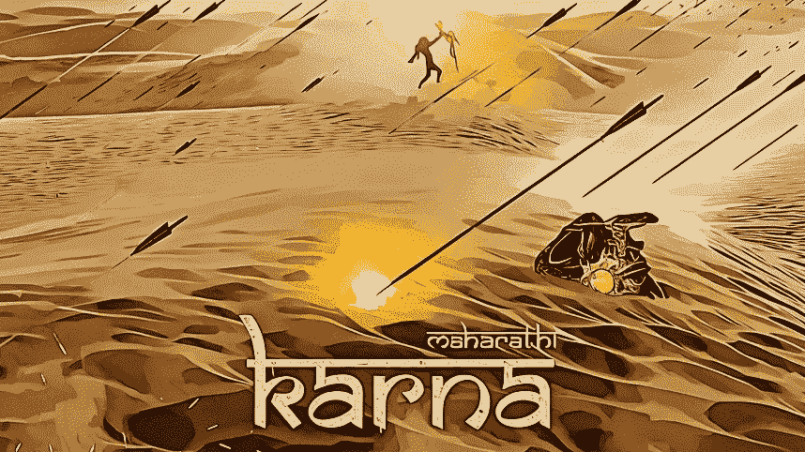Birth and Early Life:
Karna was born to Kunti, the mother of the Pandavas, through a divine boon granted by Surya, the sun god. Kunti, while still unmarried, invoked Surya and bore a son who was born with divine armor and earrings (Kavacha and Kundala), which made him invincible in battle. Due to social stigma and fear of rejection, Kunti set Karna afloat in a basket on a river, where he was found and raised by a charioteer named Adhiratha and his wife Radha. Karna grew up with a sense of abandonment and an enduring sense of not belonging to any noble lineage.
Friendship with Duryodhana:
Karna excelled in various martial arts and became a skilled warrior. Despite his low social status, his exceptional abilities drew admiration from Duryodhana, the eldest Kaurava prince. Duryodhana befriended Karna, offering him kingship of Anga (modern-day Bihar) and a place of honor among the Kauravas, which Karna accepted wholeheartedly. This friendship became one of the defining aspects of Karna’s life.
Role in the Mahabharata War:
Throughout the Mahabharata, Karna fought on the side of the Kauravas against the Pandavas, although he was aware of his true lineage as a son of Kunti. He participated in many key battles and displayed immense valor and skill. Karna’s prowess in battle was so formidable that he came to be regarded as one of the greatest warriors of his time.
Tragic Events:
Several tragic events marked Karna’s life:
- Rejection by Draupadi: At a public event, Karna was humiliated by Draupadi, who rejected him for his low birth, unaware that he was her elder brother.
- Cursed by Parashurama: Karna, who had learned the art of warfare from Parashurama by concealing his true identity, was cursed by his guru when his true caste was revealed.
- Death in the War: Karna faced Arjuna, his half-brother and the greatest warrior of the Pandavas, in a fateful battle on the 17th day of the war. Despite being disadvantaged due to various circumstances (like the wheel of his chariot getting stuck in the ground), Karna fought valiantly but was ultimately killed by Arjuna.
Legacy:
Karna is remembered in the Mahabharata as a tragic hero of great honor, loyalty, and generosity. Despite his loyalty to Duryodhana, his adherence to principles and his tragic fate evoke sympathy and admiration. His character raises profound questions about social justice, personal identity, and the consequences of choices made in life.
Moral Dilemmas:
Karna’s character in the Mahabharata is marked by several moral dilemmas and conflicts:
- Loyalty vs. Truth: Karna’s unwavering loyalty to Duryodhana often led him to support actions that were morally questionable. Despite knowing the Pandavas were his brothers, he chose to fight against them due to his allegiance.
- Social Status and Identity: Karna struggled with his identity and social status throughout his life. Despite being born to Kunti and having royal blood, he was raised as a charioteer’s son. This identity crisis influenced many of his decisions and interactions.
- Generosity and Honor: Karna was renowned for his generosity. He famously gave away his divine armor to Indra in exchange for a powerful weapon, without hesitating to sacrifice his own protection. His honor and integrity were central to his character.
Ethical Standpoints:
Karna’s story also brings forth ethical dilemmas and philosophical debates:
- Dharma (Righteousness): Karna’s adherence to dharma was often questioned. While he upheld his word and fought for Duryodhana, critics argue whether he chose the right path by supporting the Kauravas, who were known for their adharmic (unrighteous) actions.
- Fate and Free Will: Karna’s life was often seen as a play of fate and destiny. Despite possessing all qualities of a great warrior, his tragic end seemed predestined, shaped by circumstances beyond his control.
- Forgiveness and Redemption: Karna’s character also highlights themes of forgiveness and redemption. Despite his rivalry with the Pandavas, especially Arjuna, there were moments of empathy and understanding between them, showcasing the complexities of human relationships.
Cultural Impact:
Karna remains a revered figure in Indian mythology and literature. His story has inspired numerous adaptations, interpretations, and philosophical discourses across various mediums, including literature, drama, and film. He is often seen as a symbol of resilience, sacrifice, and the consequences of choices made in life.
Character and Virtues:
- Courage and Skill: Karna was unmatched in his valor and martial skills. His prowess in archery and combat earned him admiration from all quarters, even from his adversaries.
- Charity and Generosity: Karna was renowned for his generosity. He never hesitated to give away his wealth and possessions to those in need, regardless of his own circumstances. His charitable nature was exemplified in the famous incident where he gave away his armor to Indra, disguised as a Brahmin, during the Kurukshetra war.
- Duty and Sacrifice: Despite his conflicted loyalties, Karna remained steadfast in fulfilling his duties as a warrior and friend to Duryodhana. His sense of duty and honor often placed him in morally challenging situations, where he had to make difficult choices.
Legacy and Interpretations:
- Symbolism and Interpretations: Karna’s character has been interpreted in various ways across different traditions and adaptations. Some view him as a tragic hero whose noble qualities were overshadowed by his allegiances, while others emphasize his virtuous traits and the injustices he faced.
- Lessons and Philosophical Insights: Karna’s story offers profound lessons on loyalty, integrity, social justice, and the consequences of choices. It prompts philosophical reflections on the complexities of human nature and the pursuit of righteousness amidst moral dilemmas.
Psychological Depth:
- Emotional Turmoil: Karna’s character was fraught with emotional turmoil stemming from his abandonment, societal rejection, and conflicted loyalties. His interactions with various characters, especially his confrontations with Kunti and Draupadi, revealed the depth of his internal struggles and conflicting emotions.
- Self-Identity: Karna’s quest for self-identity and acceptance played a poignant role throughout his life. Despite his achievements and virtues, he grappled with feelings of inadequacy and a sense of not truly belonging, which added layers to his characterization.
Impact in the Kurukshetra War:
- Key Battles: Karna’s participation in the Kurukshetra war was pivotal. His duels with major Pandava warriors, particularly Arjuna, showcased his valor and skills. Despite facing numerous challenges and adversities, Karna fought with unwavering determination and courage until his tragic end.
- Ethical Considerations: The war also raised ethical considerations regarding the righteousness of Karna’s actions. His loyalty to Duryodhana, despite knowing the truth about his birth and the Pandavas, sparked debates about the complexities of moral duties and allegiances in times of conflict.
Final Moments and Spiritual Insights:
- Battle with Arjuna: Karna’s ultimate duel with Arjuna on the 17th day of the Kurukshetra war is a climactic moment in the Mahabharata. Despite being disadvantaged due to various factors such as his chariot wheel getting stuck, Karna fought fiercely. His battle with Arjuna is not just a physical confrontation but a symbolic clash of destinies and ideologies.
- Krishna’s Role: Throughout the Mahabharata, Krishna plays a crucial role as a strategist and advisor. His interactions with Karna, particularly before their final battle, reveal profound spiritual insights. Krishna attempts to persuade Karna to switch sides and join his brothers, emphasizing dharma and the righteousness of the Pandava cause. However, Karna remains steadfast in his loyalty to Duryodhana, highlighting his unwavering commitment to friendship and duty.
Death and Redemption:
- Tragic End: Karna’s death is a tragic culmination of his life’s struggles and choices. In the midst of battle, when his chariot is immobilized, Karna is killed by Arjuna’s arrows. Despite his immense bravery and skill, Karna meets his end fulfilling his warrior’s duty.
- Posthumous Recognition: After his death, Karna’s true identity as the eldest Pandava is revealed to his brothers and mother, Kunti. This revelation evokes deep sorrow and regret among them, recognizing the lost opportunity for familial bonds and reconciliation.
Legacy and Philosophical Themes:
- Symbol of Sacrifice: Karna’s life and death resonate as a symbol of sacrifice and the consequences of choices made in life. His story prompts contemplation on the complexities of loyalty, duty, and personal identity.
- Ethical Debates: Karna’s character sparks ethical debates on loyalty versus righteousness, fate versus free will, and the impact of societal norms and prejudices on individual destinies.
- Inspiration in Literature and Arts: Karna’s character continues to inspire adaptations and interpretations in literature, theater, and other artistic forms. His complex persona and poignant story offer rich material for exploring themes of heroism, tragedy, and the human condition.
True wisdom lies not only in knowing the right path but in walking it with integrity and compassion!!
K
Embrace the challenges that stretch you, for they are the forge where resilience and growth are forged!! – K
Every sunset brings the promise of a new dawn, reminding us that endings can be beginnings in disguise!!
K


